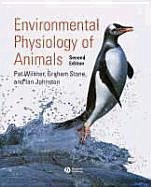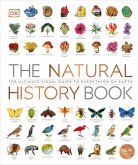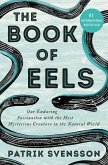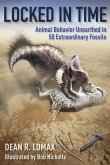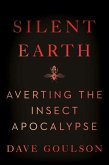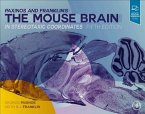Pat Willmer (University of St Andrews), Graham Stone, Ian Johnston (University of St Andrews)
Environmental Physiology of Animals
Pat Willmer (University of St Andrews), Graham Stone, Ian Johnston (University of St Andrews)
Environmental Physiology of Animals
- Gebundenes Buch
- Merkliste
- Auf die Merkliste
- Bewerten Bewerten
- Teilen
- Produkt teilen
- Produkterinnerung
- Produkterinnerung
Includes chapters on Nerves and Muscles and the Endocrine System. This book also includes comparative systems physiology and environmental physiology. It analyses and integrates problems and adaptations for each kind of environment: marine, seashore and estuary, freshwater, terrestrial and parasitic.
Andere Kunden interessierten sich auch für
![The Genetic Book of the Dead The Genetic Book of the Dead]() Richard DawkinsThe Genetic Book of the Dead23,99 €
Richard DawkinsThe Genetic Book of the Dead23,99 €![The Natural History Book The Natural History Book]() DKThe Natural History Book33,99 €
DKThe Natural History Book33,99 €![The Book of Eels The Book of Eels]() Patrik SvenssonThe Book of Eels16,99 €
Patrik SvenssonThe Book of Eels16,99 €![Locked in Time Locked in Time]() Dean R. LomaxLocked in Time16,99 €
Dean R. LomaxLocked in Time16,99 €![Silent Earth Silent Earth]() Dave GoulsonSilent Earth18,99 €
Dave GoulsonSilent Earth18,99 €![Paxinos and Franklin's the Mouse Brain in Stereotaxic Coordinates Paxinos and Franklin's the Mouse Brain in Stereotaxic Coordinates]() Paxinos, George, AO (BA, MA, PhD, DSc) , FASSA, FAA (NHMRC Senior PriPaxinos and Franklin's the Mouse Brain in Stereotaxic Coordinates173,99 €
Paxinos, George, AO (BA, MA, PhD, DSc) , FASSA, FAA (NHMRC Senior PriPaxinos and Franklin's the Mouse Brain in Stereotaxic Coordinates173,99 €![Amphibious Soul Amphibious Soul]() Craig FosterAmphibious Soul24,99 €
Craig FosterAmphibious Soul24,99 €-
-
-
Includes chapters on Nerves and Muscles and the Endocrine System. This book also includes comparative systems physiology and environmental physiology. It analyses and integrates problems and adaptations for each kind of environment: marine, seashore and estuary, freshwater, terrestrial and parasitic.
Hinweis: Dieser Artikel kann nur an eine deutsche Lieferadresse ausgeliefert werden.
Hinweis: Dieser Artikel kann nur an eine deutsche Lieferadresse ausgeliefert werden.
Produktdetails
- Produktdetails
- Verlag: John Wiley and Sons Ltd
- 2 ed
- Seitenzahl: 784
- Erscheinungstermin: 12. Oktober 2004
- Englisch
- Abmessung: 285mm x 221mm x 39mm
- Gewicht: 2272g
- ISBN-13: 9781405107242
- ISBN-10: 1405107243
- Artikelnr.: 22335463
- Herstellerkennzeichnung
- Libri GmbH
- Europaallee 1
- 36244 Bad Hersfeld
- gpsr@libri.de
- Verlag: John Wiley and Sons Ltd
- 2 ed
- Seitenzahl: 784
- Erscheinungstermin: 12. Oktober 2004
- Englisch
- Abmessung: 285mm x 221mm x 39mm
- Gewicht: 2272g
- ISBN-13: 9781405107242
- ISBN-10: 1405107243
- Artikelnr.: 22335463
- Herstellerkennzeichnung
- Libri GmbH
- Europaallee 1
- 36244 Bad Hersfeld
- gpsr@libri.de
Pat Willmer began her research career in neurobiology at Cambridge, progressively switching to broader interests in invertebrate physiology and the interactions of physiology, ecology, and behavior. Her current interests at St Andrews mainly focus on insect environmental physiology, and effects on insect-plant interactions. Graham Stone began his research career in entomology at Oxford, progressively switching to broader aspects of the biology of insect-plant interactions. His current interests at Edinburgh mainly focus on pollination ecology (particularly of Acacia communities in Africa) and the biology of oak gallwasps. Ian A. Johnston began his research career at Hull and Bristol. His research group at St Andrews is currently utilizing genomic, molecular, physiological, structural, and whole organism approaches to investigate muscle development and growth in teleost fish, with particular reference to temperature adaptation and the evolution of Antarctic and Arctic species.
Preface To Second Edition.
Preface To First Edition.
Acknowledgments.
Abbreviations.
Part I: Basic Principles:.
1. The Nature And Levels Of Adaptation:.
Introduction: Comparative, Environmental, And Evolutionary Physiology.
The Meaning Of 'Environment'.
The Meaning Of 'Adaptation'.
Comparative Methods To Detect Adaptation.
Physiological Response On Different Scales.
Conclusions.
Further Reading.
2. Fundamental Mechanisms Of Adaptation:.
Introduction: Adaptation At The Molecular And Genome Level.
Controlling Protein Action.
Control Of Protein Synthesis And Degradation.
Protein Evolution.
Physiological Regulation Of Gene Expression.
Conclusions.
Further Reading.
3. The Problems Of Size And Scale:.
Introduction.
Principle Of Similarity: Isometric Scaling.
Allometric Scaling.
The Scaling Of Metabolic Rate.
Scaling Of Locomotion.
Conclusions: Is There A Right Size To Be?.
Further Reading.
Part II: Central Issues In Comparative Physiology:.
4. Water, Ions, And Osmotic Physiology:.
Introduction.
Aqueous Solutions.
Passive Movements Of Water And Solutes.
Nonpassive Solute Movements.
Concentrations Of Cell Contents.
Overall Regulation Of Cell Contents.
Conclusions.
Further Reading.
5. Animal Water Balance, Osmoregulation, And Excretion:.
Introduction.
Exchanges Occurring At The Outer Body Surface.
Osmoregulation At External Surfaces.
Osmoregulatory Organs And Their Excretory Products.
Water Regulation Via The Gut.
Regulation Of Respiratory Water Exchanges.
Water Loss In Reproductive Systems.
Water Gain.
The Costs And Energetics Of Regulating Water And Ion Balance.
Roles Of Nervous Systems And Hormones.
Conclusions.
Further Reading.
6. Metabolism And Energy Supply:.
Introduction.
Metabolic Intermediaries.
Anaerobic Metabolism.
Aerobic Metabolism.
Metabolic Rates.
Energy Budgets.
Further Reading.
7. Respiration And Circulation:.
Introduction.
Uptake And Loss Of Gases Across Respiratory Surfaces.
Ventilation Systems To Improve Exchange Rates.
Circulatory Systems.
Delivering And Transferring Gases To The Tissues.
Coping With Hypoxia And Anoxia.
Control Of Respiration.
Further Reading.
8. Temperature And Its Effects:.
Introduction.
Biochemical Effects Of Temperature.
Physiological Effects Of Temperature.
Terminology And Strategies In Thermal Biology.
Thermal Environments And Thermal Exchanges.
Avoidance, Tolerance, And Acclimation In Thermal Biology.
Regulating Heat Gain And Keeping Warm.
Regulating Heat Loss And Keeping Cool.
Opting Out: Evasion Systems In Space Or Time.
Regulating Thermal Biology: Nerves And Hormones.
Evolution And Advantages Of Varying Thermal Strategies.
Further Reading.
9. Excitable Tissues Nervous Systems And Muscles:.
Introduction.
Section 1: Nerves.
Neural Functioning.
Synaptic Transmission.
Nervous Systems.
Neural Integration And Higher Neural Processes.
Neuronal Development.
Sensory Systems - Mechanisms And Principles.
Specific Senses And Sense Organs.
Section 2: Muscles.
Muscles And Movement: Introduction.
Muscle Structure.
Muscle Contraction.
Muscle Mechanics.
Muscle Types And Diversity.
Section 3: Nerves And Muscles Working Together.
Motor Activity Patterns.
Locomotion Using Muscles.
Conclusions.
Further Reading.
10. Hormones And Chemical Control Systems:.
Introduction.
Endocrine Systems.
Control Of Water And Osmotic Balance.
Control Of Ion Balance And pH.
Control Of Development And Growth.
Control Of Metabolism, Temperature, And Color.
Control Of Sex And Reproduction.
Hormones And Other Behaviors; Aggression, Territoriality, And Migration.
Pheromones And The Control Of Behavior.
Conclusions.
Further Reading.
Part III: Coping With The Environment:.
Introduction.
11. Marine Life:.
Introduction: Marine Habitats And Biota.
Ionic And Osmotic Adaptation.
Thermal Adaptation.
Respiratory Adaptation.
Reproductive And Life-Cycle Adaptation.
Depth Problems, Buoyancy, And Locomotion.
Sensory Issues: Marine Signaling.
Feeding And Being Fed On.
Anthropogenic Problems.
Secondary Invasion Of The Seas: Marine Vertebrates.
Conclusions.
Further Reading.
12. Shorelines And Estuaries:.
Introduction: Brackish Habitats And Biota.
Ionic And Osmotic Adaptation And Water Balance.
Thermal Adaptation.
Respiratory Adaptation.
Reproductive And Life-Cycle Adaptation.
Mechanical, Locomotory, And Sensory Systems.
Feeding And Being Fed On.
Anthropogenic Problems.
Conclusions.
Further Reading.
13. Fresh Water:.
Introduction: Freshwater Habitats And Biota.
Osmotic And Ionic Adaptation And Water Balance.
Thermal Adaptation.
Respiratory Adaptation.
Reproductive And Life-Cycle Adaptation.
Mechanical, Locomotory, And Sensory Adaptations.
Feeding And Being Fed On.
Anthropogenic Problems.
Conclusions.
Further Reading.
14. Special Aquatic Habitats:.
Introduction.
Transient Water Bodies.
Osmotically Peculiar Habitats.
Thermally Extreme Waters.
Further Reading.
15. Terrestrial Life:.
Introduction.
Ionic And Osmotic Adaptation And Water Balance.
Thermal Adaptation.
Respiratory Adaptation.
Reproductive And Life-Cycle Adaptation.
Locomotion And Mechanical Adaptations.
Sensory Adaptations.
Feeding And Being Fed On.
Anthropogenic Problems.
Conclusions.
Further Reading.
16. Extreme Terrestrial Habitats:.
Introduction.
Hot And Dry Habitats: Deserts.
Very Cold Habitats.
High-Altitude Habitats.
Aerial Habitats.
Conclusions.
Further Reading.
17. Parasitic Habitats:.
Introduction.
Parasite Environments.
Basic Parasite Physiology.
Reproduction And Transmission.
Parasite Sensory Abilities.
Parasite Regulation Of Host Physiology.
Biotic Interactions: Host-Parasite Conflicts.
Conclusions.
Further Reading.
References.
Index
Preface To First Edition.
Acknowledgments.
Abbreviations.
Part I: Basic Principles:.
1. The Nature And Levels Of Adaptation:.
Introduction: Comparative, Environmental, And Evolutionary Physiology.
The Meaning Of 'Environment'.
The Meaning Of 'Adaptation'.
Comparative Methods To Detect Adaptation.
Physiological Response On Different Scales.
Conclusions.
Further Reading.
2. Fundamental Mechanisms Of Adaptation:.
Introduction: Adaptation At The Molecular And Genome Level.
Controlling Protein Action.
Control Of Protein Synthesis And Degradation.
Protein Evolution.
Physiological Regulation Of Gene Expression.
Conclusions.
Further Reading.
3. The Problems Of Size And Scale:.
Introduction.
Principle Of Similarity: Isometric Scaling.
Allometric Scaling.
The Scaling Of Metabolic Rate.
Scaling Of Locomotion.
Conclusions: Is There A Right Size To Be?.
Further Reading.
Part II: Central Issues In Comparative Physiology:.
4. Water, Ions, And Osmotic Physiology:.
Introduction.
Aqueous Solutions.
Passive Movements Of Water And Solutes.
Nonpassive Solute Movements.
Concentrations Of Cell Contents.
Overall Regulation Of Cell Contents.
Conclusions.
Further Reading.
5. Animal Water Balance, Osmoregulation, And Excretion:.
Introduction.
Exchanges Occurring At The Outer Body Surface.
Osmoregulation At External Surfaces.
Osmoregulatory Organs And Their Excretory Products.
Water Regulation Via The Gut.
Regulation Of Respiratory Water Exchanges.
Water Loss In Reproductive Systems.
Water Gain.
The Costs And Energetics Of Regulating Water And Ion Balance.
Roles Of Nervous Systems And Hormones.
Conclusions.
Further Reading.
6. Metabolism And Energy Supply:.
Introduction.
Metabolic Intermediaries.
Anaerobic Metabolism.
Aerobic Metabolism.
Metabolic Rates.
Energy Budgets.
Further Reading.
7. Respiration And Circulation:.
Introduction.
Uptake And Loss Of Gases Across Respiratory Surfaces.
Ventilation Systems To Improve Exchange Rates.
Circulatory Systems.
Delivering And Transferring Gases To The Tissues.
Coping With Hypoxia And Anoxia.
Control Of Respiration.
Further Reading.
8. Temperature And Its Effects:.
Introduction.
Biochemical Effects Of Temperature.
Physiological Effects Of Temperature.
Terminology And Strategies In Thermal Biology.
Thermal Environments And Thermal Exchanges.
Avoidance, Tolerance, And Acclimation In Thermal Biology.
Regulating Heat Gain And Keeping Warm.
Regulating Heat Loss And Keeping Cool.
Opting Out: Evasion Systems In Space Or Time.
Regulating Thermal Biology: Nerves And Hormones.
Evolution And Advantages Of Varying Thermal Strategies.
Further Reading.
9. Excitable Tissues Nervous Systems And Muscles:.
Introduction.
Section 1: Nerves.
Neural Functioning.
Synaptic Transmission.
Nervous Systems.
Neural Integration And Higher Neural Processes.
Neuronal Development.
Sensory Systems - Mechanisms And Principles.
Specific Senses And Sense Organs.
Section 2: Muscles.
Muscles And Movement: Introduction.
Muscle Structure.
Muscle Contraction.
Muscle Mechanics.
Muscle Types And Diversity.
Section 3: Nerves And Muscles Working Together.
Motor Activity Patterns.
Locomotion Using Muscles.
Conclusions.
Further Reading.
10. Hormones And Chemical Control Systems:.
Introduction.
Endocrine Systems.
Control Of Water And Osmotic Balance.
Control Of Ion Balance And pH.
Control Of Development And Growth.
Control Of Metabolism, Temperature, And Color.
Control Of Sex And Reproduction.
Hormones And Other Behaviors; Aggression, Territoriality, And Migration.
Pheromones And The Control Of Behavior.
Conclusions.
Further Reading.
Part III: Coping With The Environment:.
Introduction.
11. Marine Life:.
Introduction: Marine Habitats And Biota.
Ionic And Osmotic Adaptation.
Thermal Adaptation.
Respiratory Adaptation.
Reproductive And Life-Cycle Adaptation.
Depth Problems, Buoyancy, And Locomotion.
Sensory Issues: Marine Signaling.
Feeding And Being Fed On.
Anthropogenic Problems.
Secondary Invasion Of The Seas: Marine Vertebrates.
Conclusions.
Further Reading.
12. Shorelines And Estuaries:.
Introduction: Brackish Habitats And Biota.
Ionic And Osmotic Adaptation And Water Balance.
Thermal Adaptation.
Respiratory Adaptation.
Reproductive And Life-Cycle Adaptation.
Mechanical, Locomotory, And Sensory Systems.
Feeding And Being Fed On.
Anthropogenic Problems.
Conclusions.
Further Reading.
13. Fresh Water:.
Introduction: Freshwater Habitats And Biota.
Osmotic And Ionic Adaptation And Water Balance.
Thermal Adaptation.
Respiratory Adaptation.
Reproductive And Life-Cycle Adaptation.
Mechanical, Locomotory, And Sensory Adaptations.
Feeding And Being Fed On.
Anthropogenic Problems.
Conclusions.
Further Reading.
14. Special Aquatic Habitats:.
Introduction.
Transient Water Bodies.
Osmotically Peculiar Habitats.
Thermally Extreme Waters.
Further Reading.
15. Terrestrial Life:.
Introduction.
Ionic And Osmotic Adaptation And Water Balance.
Thermal Adaptation.
Respiratory Adaptation.
Reproductive And Life-Cycle Adaptation.
Locomotion And Mechanical Adaptations.
Sensory Adaptations.
Feeding And Being Fed On.
Anthropogenic Problems.
Conclusions.
Further Reading.
16. Extreme Terrestrial Habitats:.
Introduction.
Hot And Dry Habitats: Deserts.
Very Cold Habitats.
High-Altitude Habitats.
Aerial Habitats.
Conclusions.
Further Reading.
17. Parasitic Habitats:.
Introduction.
Parasite Environments.
Basic Parasite Physiology.
Reproduction And Transmission.
Parasite Sensory Abilities.
Parasite Regulation Of Host Physiology.
Biotic Interactions: Host-Parasite Conflicts.
Conclusions.
Further Reading.
References.
Index
Preface To Second Edition.
Preface To First Edition.
Acknowledgments.
Abbreviations.
Part I: Basic Principles:.
1. The Nature And Levels Of Adaptation:.
Introduction: Comparative, Environmental, And Evolutionary Physiology.
The Meaning Of 'Environment'.
The Meaning Of 'Adaptation'.
Comparative Methods To Detect Adaptation.
Physiological Response On Different Scales.
Conclusions.
Further Reading.
2. Fundamental Mechanisms Of Adaptation:.
Introduction: Adaptation At The Molecular And Genome Level.
Controlling Protein Action.
Control Of Protein Synthesis And Degradation.
Protein Evolution.
Physiological Regulation Of Gene Expression.
Conclusions.
Further Reading.
3. The Problems Of Size And Scale:.
Introduction.
Principle Of Similarity: Isometric Scaling.
Allometric Scaling.
The Scaling Of Metabolic Rate.
Scaling Of Locomotion.
Conclusions: Is There A Right Size To Be?.
Further Reading.
Part II: Central Issues In Comparative Physiology:.
4. Water, Ions, And Osmotic Physiology:.
Introduction.
Aqueous Solutions.
Passive Movements Of Water And Solutes.
Nonpassive Solute Movements.
Concentrations Of Cell Contents.
Overall Regulation Of Cell Contents.
Conclusions.
Further Reading.
5. Animal Water Balance, Osmoregulation, And Excretion:.
Introduction.
Exchanges Occurring At The Outer Body Surface.
Osmoregulation At External Surfaces.
Osmoregulatory Organs And Their Excretory Products.
Water Regulation Via The Gut.
Regulation Of Respiratory Water Exchanges.
Water Loss In Reproductive Systems.
Water Gain.
The Costs And Energetics Of Regulating Water And Ion Balance.
Roles Of Nervous Systems And Hormones.
Conclusions.
Further Reading.
6. Metabolism And Energy Supply:.
Introduction.
Metabolic Intermediaries.
Anaerobic Metabolism.
Aerobic Metabolism.
Metabolic Rates.
Energy Budgets.
Further Reading.
7. Respiration And Circulation:.
Introduction.
Uptake And Loss Of Gases Across Respiratory Surfaces.
Ventilation Systems To Improve Exchange Rates.
Circulatory Systems.
Delivering And Transferring Gases To The Tissues.
Coping With Hypoxia And Anoxia.
Control Of Respiration.
Further Reading.
8. Temperature And Its Effects:.
Introduction.
Biochemical Effects Of Temperature.
Physiological Effects Of Temperature.
Terminology And Strategies In Thermal Biology.
Thermal Environments And Thermal Exchanges.
Avoidance, Tolerance, And Acclimation In Thermal Biology.
Regulating Heat Gain And Keeping Warm.
Regulating Heat Loss And Keeping Cool.
Opting Out: Evasion Systems In Space Or Time.
Regulating Thermal Biology: Nerves And Hormones.
Evolution And Advantages Of Varying Thermal Strategies.
Further Reading.
9. Excitable Tissues Nervous Systems And Muscles:.
Introduction.
Section 1: Nerves.
Neural Functioning.
Synaptic Transmission.
Nervous Systems.
Neural Integration And Higher Neural Processes.
Neuronal Development.
Sensory Systems - Mechanisms And Principles.
Specific Senses And Sense Organs.
Section 2: Muscles.
Muscles And Movement: Introduction.
Muscle Structure.
Muscle Contraction.
Muscle Mechanics.
Muscle Types And Diversity.
Section 3: Nerves And Muscles Working Together.
Motor Activity Patterns.
Locomotion Using Muscles.
Conclusions.
Further Reading.
10. Hormones And Chemical Control Systems:.
Introduction.
Endocrine Systems.
Control Of Water And Osmotic Balance.
Control Of Ion Balance And pH.
Control Of Development And Growth.
Control Of Metabolism, Temperature, And Color.
Control Of Sex And Reproduction.
Hormones And Other Behaviors; Aggression, Territoriality, And Migration.
Pheromones And The Control Of Behavior.
Conclusions.
Further Reading.
Part III: Coping With The Environment:.
Introduction.
11. Marine Life:.
Introduction: Marine Habitats And Biota.
Ionic And Osmotic Adaptation.
Thermal Adaptation.
Respiratory Adaptation.
Reproductive And Life-Cycle Adaptation.
Depth Problems, Buoyancy, And Locomotion.
Sensory Issues: Marine Signaling.
Feeding And Being Fed On.
Anthropogenic Problems.
Secondary Invasion Of The Seas: Marine Vertebrates.
Conclusions.
Further Reading.
12. Shorelines And Estuaries:.
Introduction: Brackish Habitats And Biota.
Ionic And Osmotic Adaptation And Water Balance.
Thermal Adaptation.
Respiratory Adaptation.
Reproductive And Life-Cycle Adaptation.
Mechanical, Locomotory, And Sensory Systems.
Feeding And Being Fed On.
Anthropogenic Problems.
Conclusions.
Further Reading.
13. Fresh Water:.
Introduction: Freshwater Habitats And Biota.
Osmotic And Ionic Adaptation And Water Balance.
Thermal Adaptation.
Respiratory Adaptation.
Reproductive And Life-Cycle Adaptation.
Mechanical, Locomotory, And Sensory Adaptations.
Feeding And Being Fed On.
Anthropogenic Problems.
Conclusions.
Further Reading.
14. Special Aquatic Habitats:.
Introduction.
Transient Water Bodies.
Osmotically Peculiar Habitats.
Thermally Extreme Waters.
Further Reading.
15. Terrestrial Life:.
Introduction.
Ionic And Osmotic Adaptation And Water Balance.
Thermal Adaptation.
Respiratory Adaptation.
Reproductive And Life-Cycle Adaptation.
Locomotion And Mechanical Adaptations.
Sensory Adaptations.
Feeding And Being Fed On.
Anthropogenic Problems.
Conclusions.
Further Reading.
16. Extreme Terrestrial Habitats:.
Introduction.
Hot And Dry Habitats: Deserts.
Very Cold Habitats.
High-Altitude Habitats.
Aerial Habitats.
Conclusions.
Further Reading.
17. Parasitic Habitats:.
Introduction.
Parasite Environments.
Basic Parasite Physiology.
Reproduction And Transmission.
Parasite Sensory Abilities.
Parasite Regulation Of Host Physiology.
Biotic Interactions: Host-Parasite Conflicts.
Conclusions.
Further Reading.
References.
Index
Preface To First Edition.
Acknowledgments.
Abbreviations.
Part I: Basic Principles:.
1. The Nature And Levels Of Adaptation:.
Introduction: Comparative, Environmental, And Evolutionary Physiology.
The Meaning Of 'Environment'.
The Meaning Of 'Adaptation'.
Comparative Methods To Detect Adaptation.
Physiological Response On Different Scales.
Conclusions.
Further Reading.
2. Fundamental Mechanisms Of Adaptation:.
Introduction: Adaptation At The Molecular And Genome Level.
Controlling Protein Action.
Control Of Protein Synthesis And Degradation.
Protein Evolution.
Physiological Regulation Of Gene Expression.
Conclusions.
Further Reading.
3. The Problems Of Size And Scale:.
Introduction.
Principle Of Similarity: Isometric Scaling.
Allometric Scaling.
The Scaling Of Metabolic Rate.
Scaling Of Locomotion.
Conclusions: Is There A Right Size To Be?.
Further Reading.
Part II: Central Issues In Comparative Physiology:.
4. Water, Ions, And Osmotic Physiology:.
Introduction.
Aqueous Solutions.
Passive Movements Of Water And Solutes.
Nonpassive Solute Movements.
Concentrations Of Cell Contents.
Overall Regulation Of Cell Contents.
Conclusions.
Further Reading.
5. Animal Water Balance, Osmoregulation, And Excretion:.
Introduction.
Exchanges Occurring At The Outer Body Surface.
Osmoregulation At External Surfaces.
Osmoregulatory Organs And Their Excretory Products.
Water Regulation Via The Gut.
Regulation Of Respiratory Water Exchanges.
Water Loss In Reproductive Systems.
Water Gain.
The Costs And Energetics Of Regulating Water And Ion Balance.
Roles Of Nervous Systems And Hormones.
Conclusions.
Further Reading.
6. Metabolism And Energy Supply:.
Introduction.
Metabolic Intermediaries.
Anaerobic Metabolism.
Aerobic Metabolism.
Metabolic Rates.
Energy Budgets.
Further Reading.
7. Respiration And Circulation:.
Introduction.
Uptake And Loss Of Gases Across Respiratory Surfaces.
Ventilation Systems To Improve Exchange Rates.
Circulatory Systems.
Delivering And Transferring Gases To The Tissues.
Coping With Hypoxia And Anoxia.
Control Of Respiration.
Further Reading.
8. Temperature And Its Effects:.
Introduction.
Biochemical Effects Of Temperature.
Physiological Effects Of Temperature.
Terminology And Strategies In Thermal Biology.
Thermal Environments And Thermal Exchanges.
Avoidance, Tolerance, And Acclimation In Thermal Biology.
Regulating Heat Gain And Keeping Warm.
Regulating Heat Loss And Keeping Cool.
Opting Out: Evasion Systems In Space Or Time.
Regulating Thermal Biology: Nerves And Hormones.
Evolution And Advantages Of Varying Thermal Strategies.
Further Reading.
9. Excitable Tissues Nervous Systems And Muscles:.
Introduction.
Section 1: Nerves.
Neural Functioning.
Synaptic Transmission.
Nervous Systems.
Neural Integration And Higher Neural Processes.
Neuronal Development.
Sensory Systems - Mechanisms And Principles.
Specific Senses And Sense Organs.
Section 2: Muscles.
Muscles And Movement: Introduction.
Muscle Structure.
Muscle Contraction.
Muscle Mechanics.
Muscle Types And Diversity.
Section 3: Nerves And Muscles Working Together.
Motor Activity Patterns.
Locomotion Using Muscles.
Conclusions.
Further Reading.
10. Hormones And Chemical Control Systems:.
Introduction.
Endocrine Systems.
Control Of Water And Osmotic Balance.
Control Of Ion Balance And pH.
Control Of Development And Growth.
Control Of Metabolism, Temperature, And Color.
Control Of Sex And Reproduction.
Hormones And Other Behaviors; Aggression, Territoriality, And Migration.
Pheromones And The Control Of Behavior.
Conclusions.
Further Reading.
Part III: Coping With The Environment:.
Introduction.
11. Marine Life:.
Introduction: Marine Habitats And Biota.
Ionic And Osmotic Adaptation.
Thermal Adaptation.
Respiratory Adaptation.
Reproductive And Life-Cycle Adaptation.
Depth Problems, Buoyancy, And Locomotion.
Sensory Issues: Marine Signaling.
Feeding And Being Fed On.
Anthropogenic Problems.
Secondary Invasion Of The Seas: Marine Vertebrates.
Conclusions.
Further Reading.
12. Shorelines And Estuaries:.
Introduction: Brackish Habitats And Biota.
Ionic And Osmotic Adaptation And Water Balance.
Thermal Adaptation.
Respiratory Adaptation.
Reproductive And Life-Cycle Adaptation.
Mechanical, Locomotory, And Sensory Systems.
Feeding And Being Fed On.
Anthropogenic Problems.
Conclusions.
Further Reading.
13. Fresh Water:.
Introduction: Freshwater Habitats And Biota.
Osmotic And Ionic Adaptation And Water Balance.
Thermal Adaptation.
Respiratory Adaptation.
Reproductive And Life-Cycle Adaptation.
Mechanical, Locomotory, And Sensory Adaptations.
Feeding And Being Fed On.
Anthropogenic Problems.
Conclusions.
Further Reading.
14. Special Aquatic Habitats:.
Introduction.
Transient Water Bodies.
Osmotically Peculiar Habitats.
Thermally Extreme Waters.
Further Reading.
15. Terrestrial Life:.
Introduction.
Ionic And Osmotic Adaptation And Water Balance.
Thermal Adaptation.
Respiratory Adaptation.
Reproductive And Life-Cycle Adaptation.
Locomotion And Mechanical Adaptations.
Sensory Adaptations.
Feeding And Being Fed On.
Anthropogenic Problems.
Conclusions.
Further Reading.
16. Extreme Terrestrial Habitats:.
Introduction.
Hot And Dry Habitats: Deserts.
Very Cold Habitats.
High-Altitude Habitats.
Aerial Habitats.
Conclusions.
Further Reading.
17. Parasitic Habitats:.
Introduction.
Parasite Environments.
Basic Parasite Physiology.
Reproduction And Transmission.
Parasite Sensory Abilities.
Parasite Regulation Of Host Physiology.
Biotic Interactions: Host-Parasite Conflicts.
Conclusions.
Further Reading.
References.
Index
"...this second edition confirms its status as the first place I would go for guidance in unfamiliar physiological territory. Its level is perfect for undergraduates...this is a terrific text, and one that I recommend unreservedly." Andrew Clarke, British Antarctic Survey, Trends in Ecology and Evolution, August 2004

